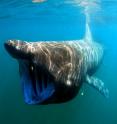NOAA designates the eastern North Pacific basking shark a 'species of concern'
NOAA's Fisheries Service has designated the eastern North Pacific basking shark, a "species of concern" because it has suffered a dramatic decline in population despite decreasing fishing pressure. The label "species of concern" may be given to a species when there are concerns regarding the population status. The eastern Pacific basking shark is not being considered for listing pursuant to the Endangered Species Act, rather it is a species of concern because it has been over fished and its population has apparently not responded to conservation measures implemented to address fishing pressure. We expect that by identifying it as a species of concern we will raise public awareness of the species status, generate interest in additional research to identify factors that may be inhibiting its recovery and, with states and other partners, restore this population before listing under the ESA becomes necessary.
Basking sharks are filter feeders that exist throughout the world's oceans from the tropics to the Arctic, although they are most commonly found in temperate coastal waters where currents converge and plankton, their main food source, concentrate. The eastern North Pacific population of basking sharks is thought to be a single group that migrates seasonally along the West Coast from Canada to Central California.
Until the 1950s, commercial fishermen in California targeted the sharks primarily for fishmeal and fish oil, and Canadian fishermen targeted them until the 1970s, in response to an eradication program that sought to reduce interactions between the sharks and salmon fishing nets. Although there has been no commercial fishing pressure for decades, scientists are worried about the eastern North Pacific population of basking sharks, whose numbers have not rebounded. While hundreds, and even thousands, of fish were once observed together, no group larger than three has been reported seen since 1993.
The species is also still vulnerable to human impacts even though it is no longer actively targeted in the United States and Canada. Fishermen may inadvertently catch the shark while fishing for another species, or it may become entangled in commercial fishing gear or hit by vessels as it feeds near the surface.
In U.S. federal waters of the Pacific, sharks caught incidentally must be released immediately, and the state of California has likewise banned the retention of basking sharks. In Canada, the Species at Risk Act makes it illegal to take, harass, or destroy habitat for basking sharks there. The species is also listed on the International Union for the Conservation of Nature (IUCN) Red List as endangered. Basking sharks may still be caught in some countries where they command a high price for their fins in shark fin soup.
Source: NOAA National Marine Fisheries Service
Other sources
- U.S. lists 'concern' for basking sharksfrom UPIWed, 8 Sep 2010, 21:07:21 UTC
- Eastern North Pacific basking shark a 'species of concern'from Science DailyWed, 8 Sep 2010, 15:28:56 UTC
- NOAA designates the eastern North Pacific basking shark a 'species of concern'from PhysorgWed, 8 Sep 2010, 13:36:07 UTC
- NOAA designates the eastern North Pacific basking shark a ‘species of concern’from Science BlogWed, 8 Sep 2010, 13:35:12 UTC
- NOAA designates the eastern North Pacific basking shark a ‘species of concern’from Science BlogWed, 8 Sep 2010, 13:35:12 UTC
